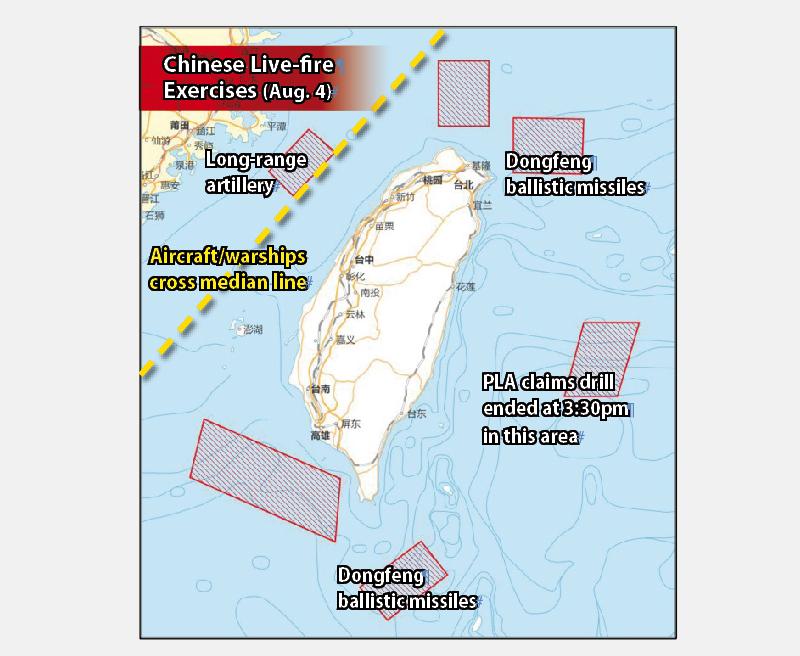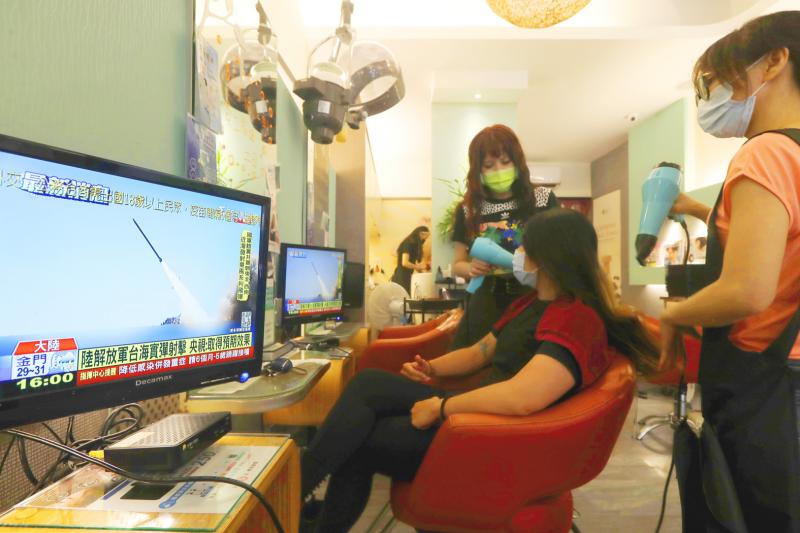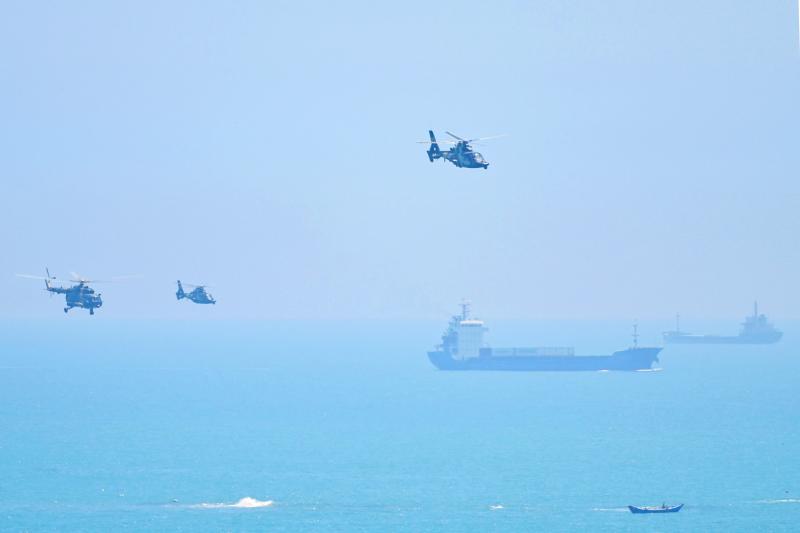China yesterday fired several Dongfeng ballistic missiles as it began four days of unprecedented military drills off Taiwan proper following US House of Representatives Speaker Nancy Pelosi’s visit to Taipei the previous day.
On Tuesday, Chinese Minister of Foreign Affairs Wang Yi (王毅) said Beijing would “take all necessary measures” in retaliation should Pelosi visit Taiwan during her Asia tour.
The Chinese People’s Liberation Army (PLA) from 1:56pm to 4pm fired 11 Dongfeng missiles into waters north, east and south of Taiwan proper, the Ministry of National Defense (MND) said.

Taiwanese armed forces, using “forward warning and surveillance mechanisms,” monitored the missile tests in real time, activated the country’s defense systems and strengthened combat preparedness, it said.
“The ministry condemns these irrational acts that are damaging to regional peace,” ministry spokesman Major General Sun Li-fang (孫立方) told a news briefing.
China is expected to hold drills in seven areas surrounding Taiwan proper over four days, rather than six areas, as China previously announced, the Maritime and Port Bureau said, adding that the additional area would be to the nation’s east.

Photo: Chiang Ying-ying, AP
China’s Xinhua news agency reported that the drills were joint operations focused on “blockade, sea target assault, strike on ground targets and airspace control.”
Ma Chen-kun (馬振坤), a professor at National Defense University, said that the drills were aimed at demonstrating the PLA’s ability to deploy precision weapons to cut off Taiwan’s overseas links and facilitate the landing of troops.
The drills would be “more complete” than previous ones, he said.

Photo: AFP
“If the PLA actually invades Taiwan in an all-out invasion, the concrete actions it will take, it’s all in this particular exercise,” Ma said. “The main thing is they will cut off Taiwan’s links to the outside world, from their sea, they would suppress the coastal defense firepower.”
The US Navy said that its USS Ronald Reagan aircraft carrier was operating in the Philippine Sea as part of “normal scheduled operations.”
Propaganda footage purportedly filmed during the drills indicated that DF-15B missiles were used, said Su Tzu-yun (蘇紫雲), an analyst at the MND-funded Institute for National Defense and Security Research.
The DF-15B, which entered Chinese service in about 2000, has a range of 600km and a circular error probable of 150m to 200m, meaning half the missiles would fall within that distance of a target, he said.
Predecessors of the DF-15B were fired during the Third Taiwan Strait Crisis in 1995 and 1996, he said.
The Ministry of Foreign Affairs protested the drills, saying they threatened Taiwan’s national security, contributed to rising regional tensions, and caused disruptions in global trade and communications.
“The [foreign] ministry strongly condemns the Chinese imitation of North Korea’s behavior in conducting live-fire missile tests near another country’s sovereign waters and urges the communist regime to exercise self-control,” it said.
The global community should support Taiwan in defending the values of freedom and democracy, the rules-based international order, and a free and open Indo-Pacific region, it said.
Presidential Office spokesman Xavier Chang (張惇涵) decried China’s persistent and deliberate escalation as causing harm to trade and the freedom of navigation.
The office urges reason and self-restraint in Beijing, he said.
President Tsai Ing-wen (蔡英文) is coordinating the government’s response with that of Taiwan’s like-minded regional allies, he said, adding that all necessary and appropriate measures would be taken.
Taiwan would not compromise on the firm defense of its sovereignty, territorial integrity and the alliance of freedom, he said.
Taiwanese and the nation’s political parties should unite in solidarity with Taiwan’s democratic partners to stop China’s irrational and unilateral military actions, he added.
Japan also protested, as five Chinese ballistic missiles appeared to have landed in Japan’s exclusive economic zone (EEZ).
“To have five Chinese missiles fall within Japan’s EEZ like this is a first,” Japanese Minister of Defense Nobuo Kishi told reporters. “We have protested strongly through diplomatic channels.”
The zone stretches 200 nautical miles (370.4km) from the outer limits of Japan’s territorial seas. North Korean missiles have fallen within a different part of Japan’s EEZ in the past, including several earlier this year.
Additional reporting by Aaron Tu, Su Yung-yao and agencies

The Central Election Commission has amended election and recall regulations to require elected office candidates to provide proof that they have no Chinese citizenship, a Cabinet report said. The commission on Oct. 29 last year revised the Measures for the Permission of Family-based Residence, Long-term Residence and Settlement of People from the Mainland Area in the Taiwan Area (大陸地區人民在台灣地區依親居留長期居留或定居許可辦法), the Executive Yuan said in a report it submitted to the legislature for review. The revision requires Chinese citizens applying for permanent residency to submit notarial documents showing that they have lost their Chinese household record and have renounced — or have never

A magnitude 5.6 earthquake struck off the coast of Yilan County at 12:37pm today, with clear shaking felt across much of northern Taiwan. There were no immediate reports of damage. The epicenter of the quake was 16.9km east-southeast of Yilan County Hall offshore at a depth of 66.8km, Central Weather Administration (CWA) data showed. The maximum intensity registered at a 4 in Yilan County’s Nanao Township (南澳) on Taiwan’s seven-tier scale. Other parts of Yilan, as well as certain areas of Hualien County, Taipei, New Taipei City, Taoyuan, Hsinchu County, Taichung and Miaoli County, recorded intensities of 3. Residents of Yilan County and Taipei received

Taiwan has secured another breakthrough in fruit exports, with jujubes, dragon fruit and lychees approved for shipment to the EU, the Ministry of Agriculture said yesterday. The Animal and Plant Health Inspection Agency on Thursday received formal notification of the approval from the EU, the ministry said, adding that the decision was expected to expand Taiwanese fruit producers’ access to high-end European markets. Taiwan exported 126 tonnes of lychees last year, valued at US$1.48 million, with Japan accounting for 102 tonnes. Other export destinations included New Zealand, Hong Kong, the US and Australia, ministry data showed. Jujube exports totaled 103 tonnes, valued at

BIG SPENDERS: Foreign investors bought the most Taiwan equities since 2005, signaling confidence that an AI boom would continue to benefit chipmakers Taiwan Semiconductor Manufacturing Co’s (TSMC, 台積電) market capitalization swelled to US$2 trillion for the first time following a 4.25 percent rally in its American depositary receipts (ADR) overnight, putting the world’s biggest contract chipmaker sixth on the list of the world’s biggest companies by market capitalization, just behind Amazon.com Inc. The site CompaniesMarketcap.com ranked TSMC ahead of Saudi Aramco and Meta Platforms Inc. The Taiwanese company’s ADRs on Tuesday surged to US$385.75 on the New York Stock Exchange, as strong demand for artificial intelligence (AI) applications led to chip supply constraints and boost revenue growth to record-breaking levels. Each TSMC ADR represents